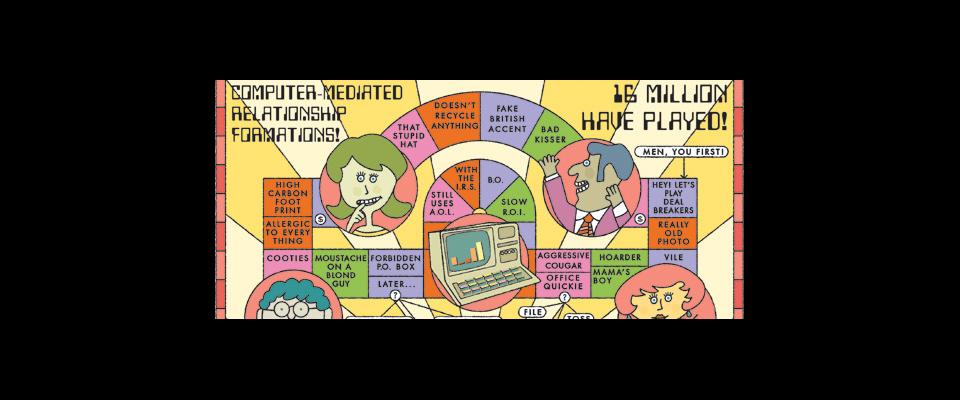Online or off, couples still have to click.
She’s hurrying down a city street in an evening dress, high heels clicking. She’s nervous but excited—we know this because we’re watching her in an ad for an online dating site. Opening the door to a restaurant, she pauses, which can only mean …. Look, he’s there at the bar.
She halts there in the doorway. He turns. They smile. This is the moment, after all—the transition from online dating to real romance. Here, in the doorway of a restaurant, is where the commercial ends, and advertising fails to reveal the predictable outcome:
They won’t like each other.
New Berkeley research shows that online daters like each other more before they actually meet in person—it’s that first face-to-face where things slide downhill, and average daters report disappointment across the board, let down on everything from looks to personality.
And though this may sound depressing—or familiar—to online daters, it’s a novel finding for academics who have historically struggled to research relationship formation and attraction. What newly acquainted couple, after all, wants to spend their first date in a lab?
So this is the beauty of online dating research: It’s a new way to test old theories of interpersonal attraction and partner selection. Berkeley researchers are mining the online dating world for understanding of our offline lives, and the results of their studies make a science of what seems simple: The woman in the online dating commercial, for example, walking across the restaurant and discovering, as her date stands up, that he’s shorter than she expected.
If only they had both read the research, his height wouldn’t have been a surprise. And neither would her bulging waistline. Studies now show that men looking for a mate over the Internet tend to slightly exaggerate their height, while women tend to under-report their weight. In truth, neither sex tweaks their stats enough to call it lying, but rather more like wishful thinking—or, as researcher Andrew T. Fiore puts it, “strategic self-presentation.”
Fiore spent six years studying online dating at Berkeley’s School of Information, where he got his Ph.D. in August. He also picked up a master’s degree in statistics from Cal in 2009. Another benefit of online dating research is the vast volumes of ready data. Unlike couples who meet for the first time in person, an online dater’s every move can be logged electronically—meaning Fiore and colleagues, with the cooperation of an unnamed online dating company, had reams of users to survey and data to draw from.
As a result, their research has turned the seemingly incalculable—desire, intimacy, self-presentation—into a set of chartable factors. We now know, for example, that the likelihood of a reply to a message sent by one online dater to another drops roughly 0.7 percent with every day that goes by. We know men initiate more than three-quarters of online exchanges, seek out younger women, and generally cast a wide net—they set less-restrictive preferences for partners than women do, and are less discriminating when it comes to communicating with potential dates.
“For online daters seeking to improve their odds of finding a mate,” reads one study co-authored by Fiore, “the message is clear: Choose wisely, and, if possible, be female.”
Lindsay Shaw Taylor, M.A. ’04, Ph.D. ’08, a researcher in Berkeley’s Department of Psychology collaborating with the School of Information, has co-authored multiple scholarly articles with Fiore, who is now a visiting assistant professor at Michigan State University. At Berkeley, Taylor is working on a study of Internet dating and race. (Her research suggests that though online daters may say they’re willing to date outside their own race, most people seek out partners like themselves, consciously or not.)
“We can use the Internet to test how people form relationships,” Taylor says. “The online world is the real world.”
The World Wide Web was still new when online dating emerged in the mid ’90s. As Web technology developed, it slowly shed its stigma. No longer perceived as the realm of pasty outcasts, online dating was presented and marketed as a technology suitable for everyone. It became a virtual bazaar of romantic possibilities that would, by dint of volume, speed, and searchability, change the way we date and increase the odds that everyone—even the shy, undesirable, and hopeless—would finally find love.
It was hype. Today, according to The New York Times, some 30 million people log on to dating sites, and Americans are expected to spend $1.7 billion on virtual dating by 2013. That’s a lot of opportunity for romance. Or maybe not. Studies show that virtual daters behave largely like their face-to-face counterparts, which is to say they make a lot of snap judgments and put considerable emphasis on looks.
Taylor’s research shows that online daters who are considered more attractive get the most attention; some receive many, many more messages a week. And contrary to longstanding theories that people gauge their own attractiveness and then only pursue dates at their own level, online dating studies show that both men and women routinely strive for the “prettiest, best partner out there,” Taylor says.
And what was true in high school remains true online: “Somehow the popular people online end up talking more to the other popular people,” Taylor says. This is especially fascinating when you consider that the daters Taylor studied had no way of knowing one another’s popularity online—they just manage to find each other. In one study, Fiore and Taylor address this issue with a bit of practical advice: “More-popular people reply less often,” they write, “so slightly less attractive targets might be a safer bet.” In other words, if you want to go on a real date, pal, pursue someone you might actually get.
Online daters are forced to find each other and communicate through what researchers call a “lean” medium—Internet exchanges are seldom in real time and they lack standard social cues (tone, gesture, facial expression). And there is no social context. Few people, Fiore notes, would approach an attractive stranger in a bar if that stranger were surrounded by other admirers. An online dater, however, would have no idea. And it’s this lack of information that may explain why so many report disappointment after their first in-person encounters.
In his research, Fiore cites the work of sociologist Erving Goffman, a one-time Berkeley professor who saw social interactions as a kind of performance where everybody “gives” certain signals intentionally, and “gives off” other signals unintentionally. Observers interpret the nuanced totality of the show and decide: Do I like this person, or not?
“Face to face, it’s hard not to let something leak off around the edges of your performance,” Fiore says. Online, however, the performance is totally scripted. Internet daters can spend hours crafting the perfect profile—witty, charming, caring but not overly so—thus their performance prevents or covers up any accidental leakage of unattractive traits.
What’s more, it seems that online daters may fill in the blanks about one another with what they wish were there, imagining qualities and details in the absence of any real information. It’s a tendency that says something about being human and hopeful—it’s also a tendency, Fiore notes, that sets online daters up for letdown: What relative stranger can really best our dream date?
Online dating sites now promise to link users through compatibility algorithms and special matching software. Taylor notes that the very nature of Internet romance—the users surfing through potential mates, picking a partner rather than waiting for one to come along—may bolster a participant’s sense of optimism, for better or worse.
“The promise of online dating is that we have so many people out there,” Fiore says, “You can search and search until you find the right one. It turns out, however, that you still have to meet them.”
No matter what strangers think going into a first date, Berkeley research shows it’s the impression a dater goes home with that has the greatest impact on relationship satisfaction and duration—a finding that confirms what anybody would know intuitively.
In fact, Fiore’s research shows that once those two virtually smitten people finally meet and get past any initial—and one hopes, not insurmountable—disappointment, physical attractiveness is the least important factor when it comes to predicting the likelihood of a second date. The most important factor? How well daters feel they got to know each other.
Which means the route to success in online dating is pretty much what your grandmother mapped out for you years ago when that senior you had been eyeing all year invited you to the prom and then dumped you for a cheerleader. Says Fiore, “You just have to go on a lot of first dates.”


















